 Home Based Care
Home Based Care Food Packs for Child Headed Homes
Food Packs for Child Headed Homes
 School Fees
School Fees Breakfast Programme
Breakfast Programme Hospital Trips
Hospital TripsTshelanyemba AIDS Care and Prevention Programme (TACPP)
 HBC
HBC Food shortages
Food shortages Training plan
Training planNehemiah AIDS Relief Project
 Support groups
Support groups Income generating schemes
Income generating schemes Funding
FundingCommunity Care Programme (CCP), Matopas
CCP began as a HBC team serving 5 villages trained and led by Willard and Modester Ndlovu, a Salvation Army couple, now in their early 40s. Matilda Project started funding supplies for the volunteers in 2001. Since the partnership began Modester has trained as a nurse and is now sister-in-charge of a government clinic in the area. In 2007 Beauty and Nompilo joined CCP staff to assist with the administration of school breakfasts in 3 and 4 primary schools respectively.
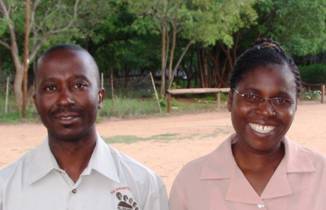
Willard and Modester
At January 2011 CCP is working in 11 villages. Each village has appointed a volunteer co-ordinator who keeps records of patients, orphans, etc. The co-ordinator is the key person to whom supplies are delivered. He or she plans care visits, assigns volunteers to patients, encourages others to help out with school breakfasts or to become a HBC volunteer.
All of CCP’s work in done in consultation with local leadership, including village heads, District Council, school heads, and representatives from the National AIDS Council.
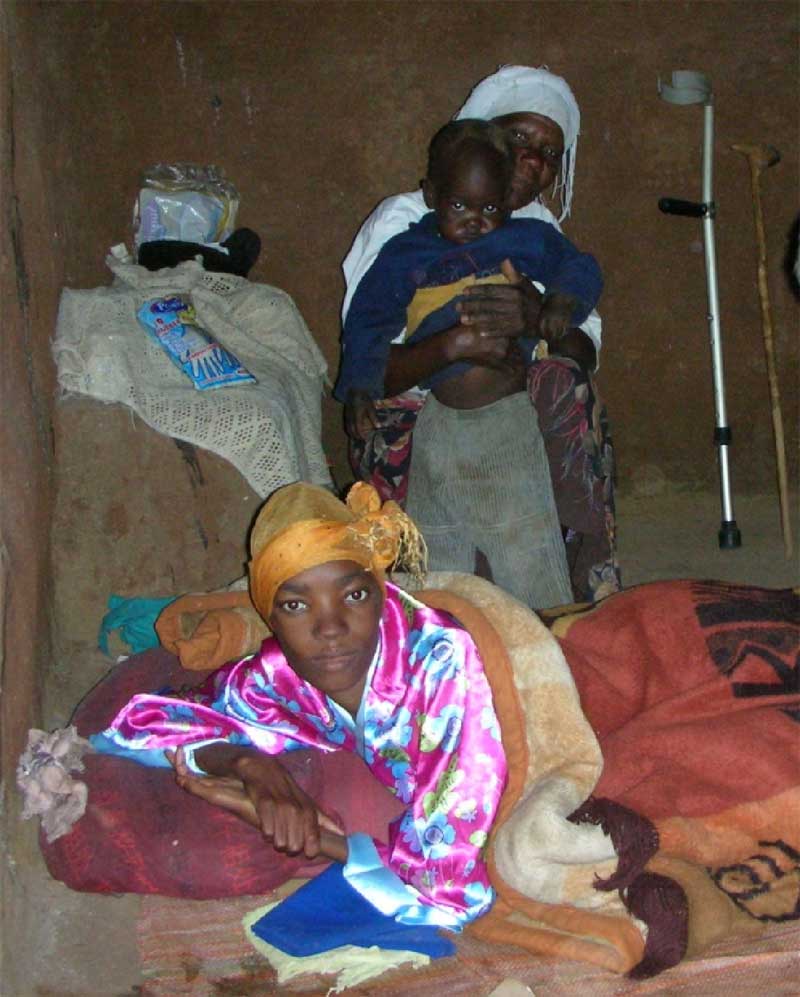
Terminally ill patient, 23 years old, with her small son held by a HBC volunteer. Died following month in 2009.
She had gone to South Africa for work in a diner. Her son was born there. Her HIV infection became full blown AIDS there and she was hospitalised.
Came home to her village to die. As a single mother, she was very anxious about her son’s future and HIV status.
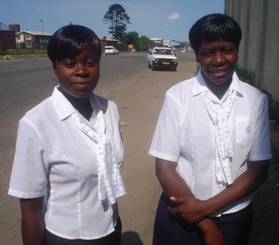
Beauty (L) and Nompilo
- Home Based Care (HBC) with 127 trained and 75 untrained HBC volunteers. Supplies for 2 months cost approx. €450.
- Total patient numbers in January 2011 were 554:
- 15 terminal
- 45 bed-bound
- 494 mobile
- Food packs for Child Headed Homes (CHH) delivered every 3 months to 245 orphans. Contain basic food supplies (€9.50) and sanitary protection for the teenage girls (€5.40 for 3 packs of 12).
- School fees for 50 orphans who had dropped out of school because they couldn’t afford the fees (€6.60/term at primary level)
- School breakfast programme for 2,495 primary school students. 7 primary schools are in the programme. Porridge costs €4.50/child for a term of 3 months.
Willard sources the supplies at the best prices available and delivers them every 2 weeks to each school. 4 teams of 4 volunteer cooks work each morning for a week each month in all but the biggest school, which needs 6 cooks to serve 550 children.
The head teachers are very enthusiastic about the breakfast programme: more kids come to school more often and have improved concentration. Many children have no breakfast before the walk to school and nothing to bring to eat during the school day, so used to try and learn on empty stomachs!
(left) Serving porridge to Grade 0 at the largest of the primary schools. Each child gets 2 mugs in their bowl. Youngest served first. Volunteers wash and rinse each child’s bowl before filling with porridge. Water all carried from the well about 1km away. - Hospital trips Willard makes 5 or 6 each month to transport the sickest from each village to hospital for tests, treatment and medication. Up to 15 patients can fit in the Hilux per trip unless some have to lie down all the way. Most patients cannot afford to pay the fare to hospital. This service is literally life-saving as patients who are prescribed ART recover most of their health and can live for several years if they can continue to access their medicines.
CCP provides:
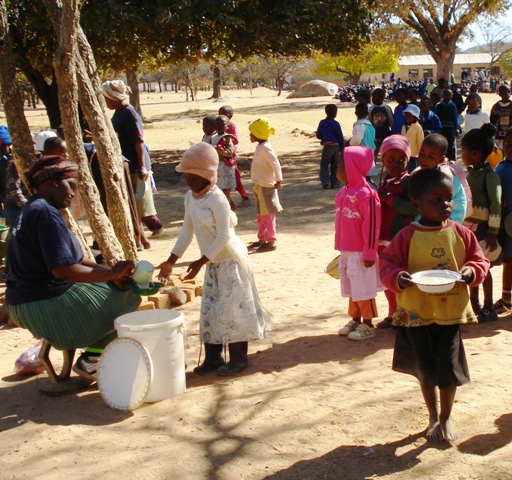
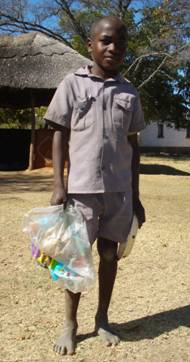
each child brings his or her own bowl to school
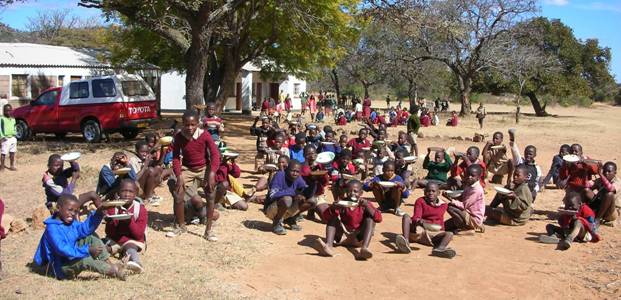
School breakfasts
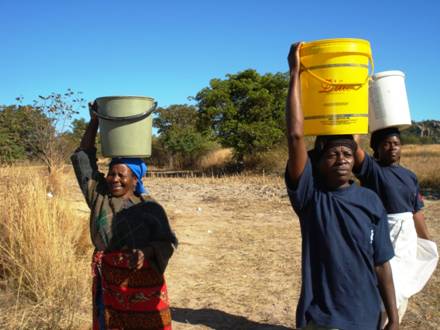
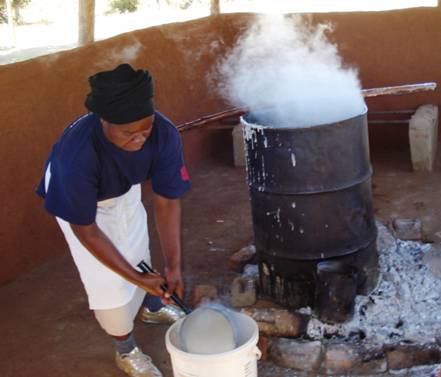
At the biggest school 4 teams of 6 volunteers cooks for a week per month each. They light the fire, collect water, cook, wash the bowls and the cooking “pot” (a petrol barrel), serve. A full morning’s work. (above left) On the way back from the well with 10 litres of water/bucket. No lids!
(above right) Breakfast is ready! Using a long-handled saucepan to transfer the porridge from the cooking pot to the bucket for carrying out to the line of 550 kids. The small pot is for tea for the cooks! Porridge is made from ground maize meal with water, sugar and salt. On alternate days either cooking oil or peanut butter is added for extra nutrition. Stirring it is hard work. Each community had to build a shelter over the cooking area.
Tshelanyemba AIDS Care and Prevention Programme
Based in the Salvation Army’s Tshelanyemba Hospital in the south-west corner of Zimbabwe, this programme is run by Gift Moyo who is also the hospital’s rehabilitation therapist. TACPP started in 1994. Programme activities have developed to include in-hospital pre and post-test counselling, training of HBC volunteers, orphan care volunteers, support groups and peer educators who are all community based volunteers. Matilda Project has been funding TACPP, mainly HBC supplies and food packs, since 2005.
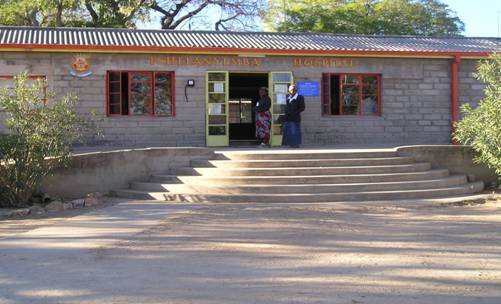
Developing our partnership is difficult due to lack of communication infrastructure. For 4 years now Tshelanyemba’s phone line has been dead, so no e-mail!! When Gift is in an area with cell phone coverage he sometimes sends SMS. When he’s in a city he uses internet shops to send e-mails (perhaps once a quarter).
190 HBC volunteers are active in the villages around the hospital, a catchment population of 35,000. First quarter figures for 2011 recorded a total of 390 HBC patients, 26 of whom were bedridden, 74 ambulatory and 290 fit to work due to roll out of anti-retroviral therapy. Trained volunteers are involved in providing nursing care, counselling and other practical support for terminally ill clients at community level. A discharge plan is in place in the hospital and all terminally ill clients are referred to their nearest HBC volunteer.
The HBC volunteers are also actively involved in the TB DOTS programme which had 63 newly notified patients in the first quarter of 2011 and 39 carried over from 2010. They are trained to observe and support all TB clients until they complete their course of medication.
Food shortages are a serious challenge here due to several years of drought and crop failure. (In a good year rainfall reaches 400 mm.) Many patients are in need of food assistance, as are households with several orphans but no income.
Below: families collecting packs
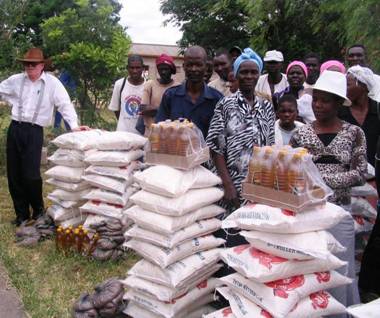
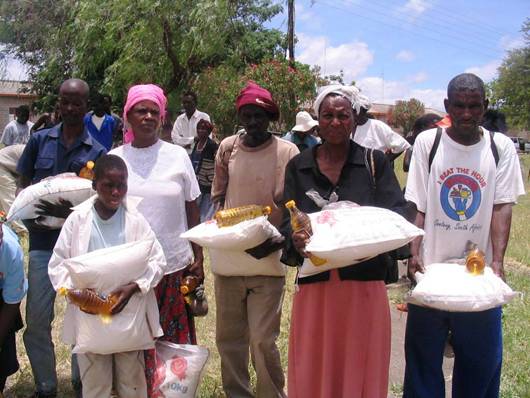
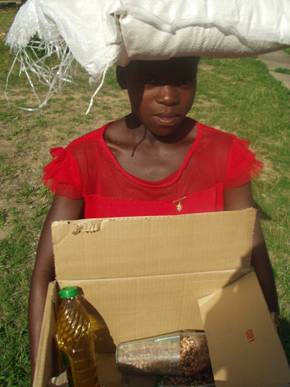 Sambulo in 2006, aged 15, bringing home some food supplies. She has been the head of her family since she was 13 or 14. As well as younger siblings she had a very elderly Gogo (grandmother) to care for who was blind. The family lives in extreme poverty and would be lost were it not for help received through the hospital and TACPP with used clothes, food packs and school fees. Sambulo completed Forms 1-4 of secondary school and now needs some way of making an income. One of her younger sisters had a baby last year.
Sambulo in 2006, aged 15, bringing home some food supplies. She has been the head of her family since she was 13 or 14. As well as younger siblings she had a very elderly Gogo (grandmother) to care for who was blind. The family lives in extreme poverty and would be lost were it not for help received through the hospital and TACPP with used clothes, food packs and school fees. Sambulo completed Forms 1-4 of secondary school and now needs some way of making an income. One of her younger sisters had a baby last year.
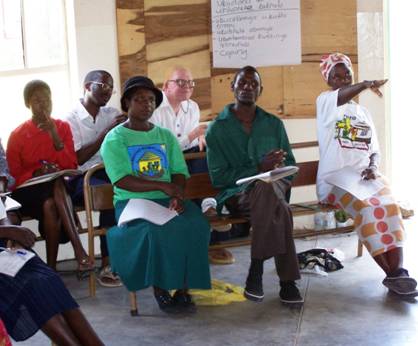
Home Based Care training workshop for volunteers at Tshelanyemba.
Gift and Willard in the back row. (Note: Gift is albino and has poor sight)
TACPP’s training plans for 2011
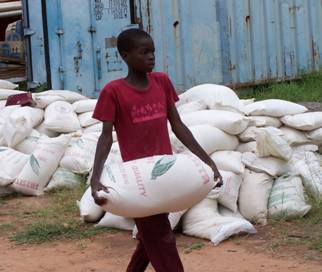
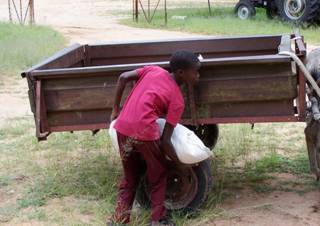
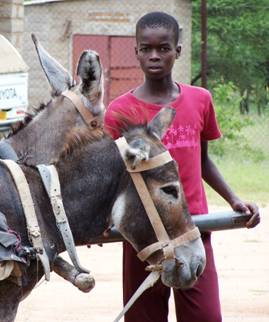
- Training workshop for HBC Caregivers on Child care (20 participants x 3 days).
Caregivers will be trained in:- Child counselling
- Identifying the needs of children
- Facilitating disclosure
- Pediatric ART.
- We hope to conduct a meeting for 20 community leaders to consciencetize them on the need to support the activities.
- Workshops during school holidays on life skills and psychosocial support for CHH orphans, targeting 20/session.
- Training workshops for children living with HIV. We hope to be supported by the staff from the Opportunistic Infections clinic.
Focus on issues like:
- challenges of disclosure
- importance of knowing your HIV status
- Pediatric ART
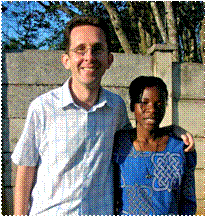
Dave and Gloria Green have been involved with Nehemiah Project since helping to start it in 2001, with support from their church. Dave is now on the board.
Following the success of their first support groups, Gloria started a new group for about 30 women working in prostitution. Called ‘Shining Stars’.
The only one of our partners in an urban area (Bulawayo, Zimbabwe’s second biggest city in the south west). Medical care is more easily available to the clients of the Nehemiah Project so the main care is done through Support Groups for those affected by HIV. This means that not everyone at a support group meeting is necessarily HIV +ve. Members may have been bereaved, often many times, or be married to someone who is +ve. No one has to disclose their HIV status unless they want to.
“Being part of a support group is in the Top Ten Survival Tips for Living with HIV!!” (member). To be able to talk openly about symptoms, share fears and coping strategies, just be with others who are openly HIV +ve, contributes to reducing the terror of receiving a +ve result to a HIV test.
“The support groups spend a lot of time developing a family atmosphere so that in a way the group members become part of one’s extended family.”
Average monthly attendance at support groups is 360. Each group has a working committee that is responsible for the meetings chosen by support group members.
Members of the city centre group have some income-generating schemes, like a peanut butter machine and jam and marmalade making. $450 sent in March 2011 to replace the original peanut butter grinder which had worn out. Another group in a high density suburb, Cowdray Park, has a bread-making project. Cowdray Park has 20,000 population with a large proportion soldiers and migrant workers. HIV incidence rate is higher than average, as are numbers of widows and orphans.
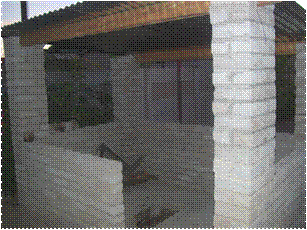
Shelter built over bread-making oven in the plot of a support group member’s home. A wood fire is built in the hole in the ground. When the charcoal is hot, loaf tins are placed on top of it and the oven is covered to bake the bread. Earlier the dough is kneaded and left in the sun to rise. Rolls are also baked with a sugary glaze on top which sell very quickly! Matilda Project sent $600 for shelter. (Keeps rain out during rainy season!)
The Shining Stars group has a market garden for the members to grow vegetables which they can sell as an alternative income for those trying to get out of prostitution. Some of the women had taken in too many orphans and couldn’t support them, so turned to commercial sex work.
Level of funding for first quarter of 2011 was $2400:
- $1800 for medications to treat opportunistic infections for support group members when the hospitals cannot provide them/have run out. A major change since our funding partnership with Nehemiah began is that now HBC supplies are only bought when a client is sick. In the early days they always had extremely sick clients.
- $120 cost of transport to visit clients (approx. 20 visits by volunteers a day. Most visits in volunteers’ neighbourhood)
- $80 for refreshments for support group meetings
- $400 for transport to hospital for sick clients, stationery and part of the allowance for HBC co-ordinator
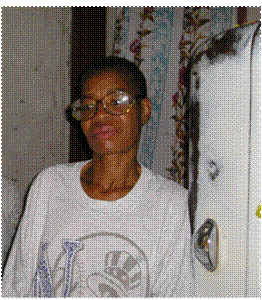
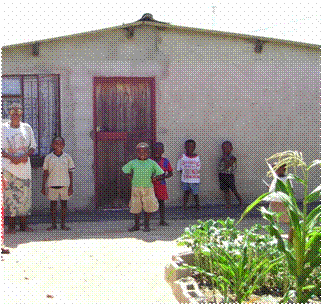
A support group member before she got access to ART. Now her health is much better. Her home is in a high density suburb of Bulawayo (greens and maize growing in the plot).
Nehemiah Project is also involved in orphan care which is funded by other donors in a suburb called Sauerstown. A small suburb of Bulawayo of about 13,000 people, established in 1970s. Originally a “dumping” ground for families of mixed parents (black and white), today it still has a large mixed population. Sauerstown is a suburb that is forgotten by the community at large but also by NGOs, churches and other organisations involved in relief ministries. It is a major centre of prostitution. Nehemiah Project initiated a support programme for children including kids clubs, dance and drama groups with psycho-social support, bereavement counselling, food support and education assistance.
Palliative Care Workshop: conducted in augest 2009 for 75 HBC volunteers
feedback on reasons for high HIV prevalence and how to reduce it
Q 1 What are the reasons HIV is so widespread in your community?
- People don’t go for a HIV test before engaging in sex
- Won’t accept 1 partner only/practise polygamy
- Rape
- Sexual abuse of children
- Passing wife/widow along family on husband’s death
- Sugar daddy/mama
- Drug and alcohol abuse
- Small house = girlfriend/”bit on the side” in addition to wife
- Failure to respect own body, the temple of the Holy Spirit
- Failure to disclose HIV status
- Failure to use condoms. Men prefer “flesh to flesh”.
- Use of sharp objects on many clients by traditional healers/witch doctors
- Caring for terminal patients without protection (e.g. gloves)
- Lack of knowledge
- Lack of respect
- Blood contact in accidents
- Kissing person with mouth sores
- Born +ve
- Using contaminated razor blades to cut hair
- Risky behaviour if travelling
- How women dress
Q 2 How can this change?
- Know your HIV status
- Lessons on HIV to include everyone
- 18 years = majority age is not OK
- HIV test before marriage
- Firm law about disclosing status, with punishment for those who spread HIV
- HIV should be discussed at home and in church
- Family law for condom use
- Bring your own razor blade to witch doctor
- Life sentence for rapists
- Avoid lust
- Women should dress decently
- Keep marriage pure. 1 + 1 = 1
- Respect between fathers and daughters: avoid taking sugar daddies
- Be born again
- Men accept to wear condoms
- Women stop using daughters for food
- Rules about behaviour: polygamy to stop, wives being taken by another family member to stop
- Adhere to 10 commandments
- Cut organs of rapists! (VERY heated discussion)
- Income generating projects
- Have village meetings to discuss HIV and AIDS
Q 3 Dream! About what your villages could be like without HIV
- Our society would be full of life and peace. We can live a full life and be healthy.
- Less orphans
- Good relationships
- Less poverty
- We’d be able to plough and work for our families
- Less death
- Better world for children
- Honest, faithful partners
- People can grow old